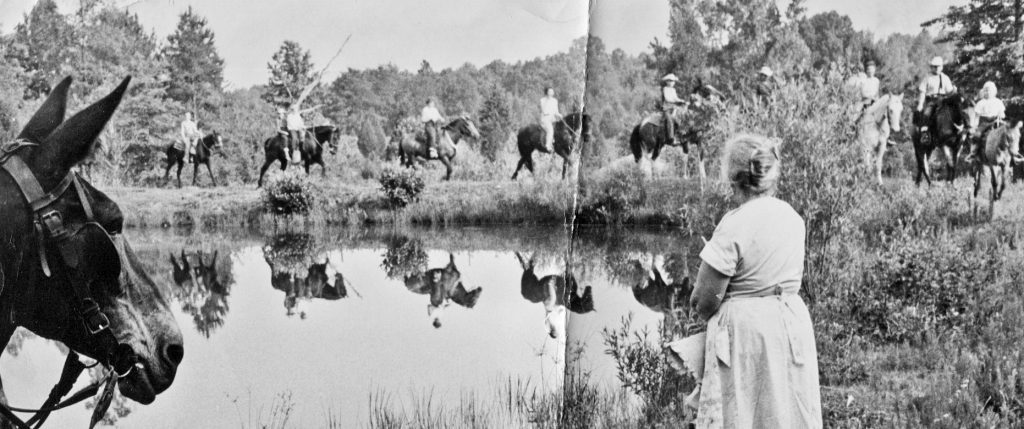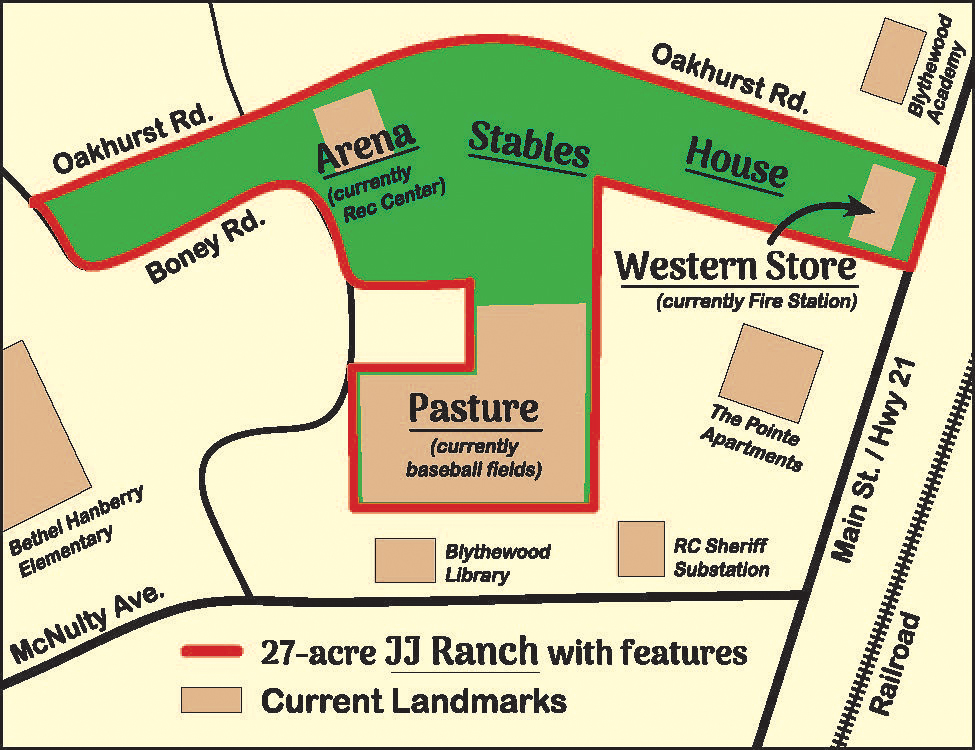
BLYTHEWOOD – It was billed as an evening to remember the JJ Ranch, a dude ranch that existed in downtown Blythewood from 1958 – 1964. But it turned out to be more than that. It was an emotional reunion of almost a hundred people, most of whom were former JJ Ranch trail riders, now adults in their 70s and 80s.
For more than two hours attendees poured out their memories of the six magical years they spent riding and working at the JJ Ranch, like living in a western movie. It was something unique, something that, probably, no other town – as a town – has ever experienced.
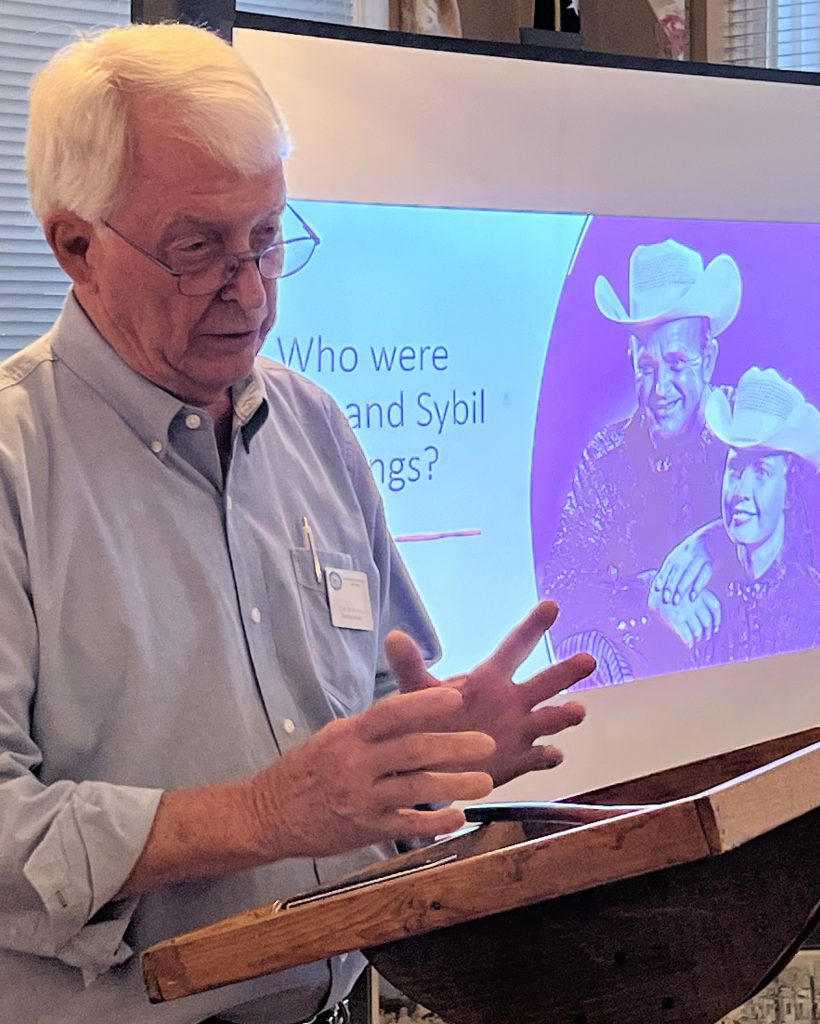
The program opened with organizer Jim McLean talking about how the JJ Ranch came to be, what it was like, and how it ended.
“The JJ Ranch changed the culture of Blythewood,” McLean said. And, indeed it did. “When Jimmy and Sybil Jennings rode into town with their two young children, Josie and Michael, there was only, maybe, one horse in the whole town. After they were gone, it seemed like almost everyone was riding horses. Blythewood, before the Jennings came,” McLean said, “had been known for little more than the railroad that ran through it.”
In 1958, Jim Jennings and his wife Sybil arrived in Blythewood, purchased 27 acres in the middle of town, and built a dude ranch. As the ranch took shape so did the town’s new culture. By all accounts of those who lived in Blythewood at the time, a large population of the town started riding horses at the JJ Ranch and dressing in western clothes that they purchased at the JJ Ranch’s western store which was located where the town’s fire station is today.
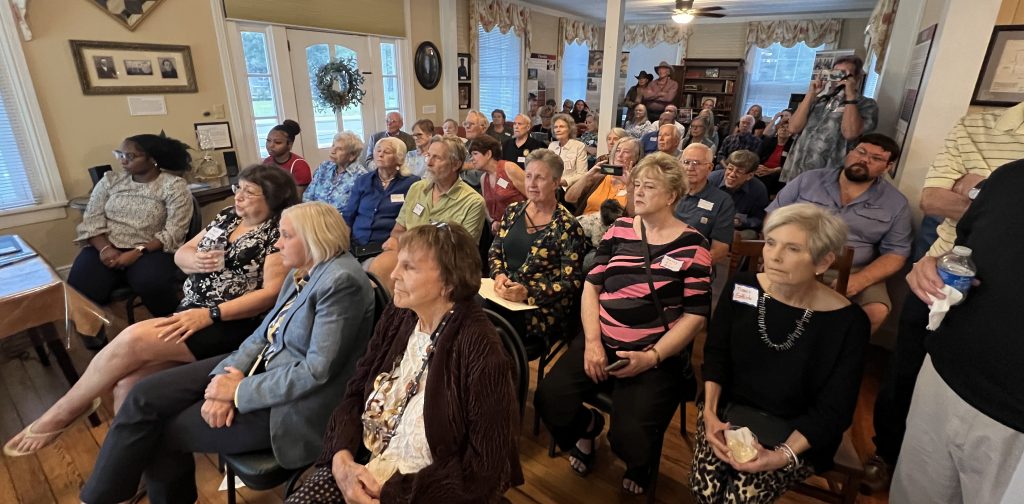
Those gathered at the Langford-Nord house to remember the JJ Ranch talked about how they went on days-long trail rides, camped out overnight and slept on bedrolls under the stars. And, back at the ranch, everyone pitched in, voluntarily and happily, to help with the ranch work – cleaning stalls, mending fences, etc.
But it was not a ranch where kids just came out on weekends to ride. They were at the ranch throughout the week, sometimes as late at 10 p.m. on school nights, according to one woman who attended the event. It was also something whole families participated in. Wealthy physicians from Columbia, who rode with their families at the JJ Ranch regularly, were frequently observed mucking stalls and doing other farm chores.
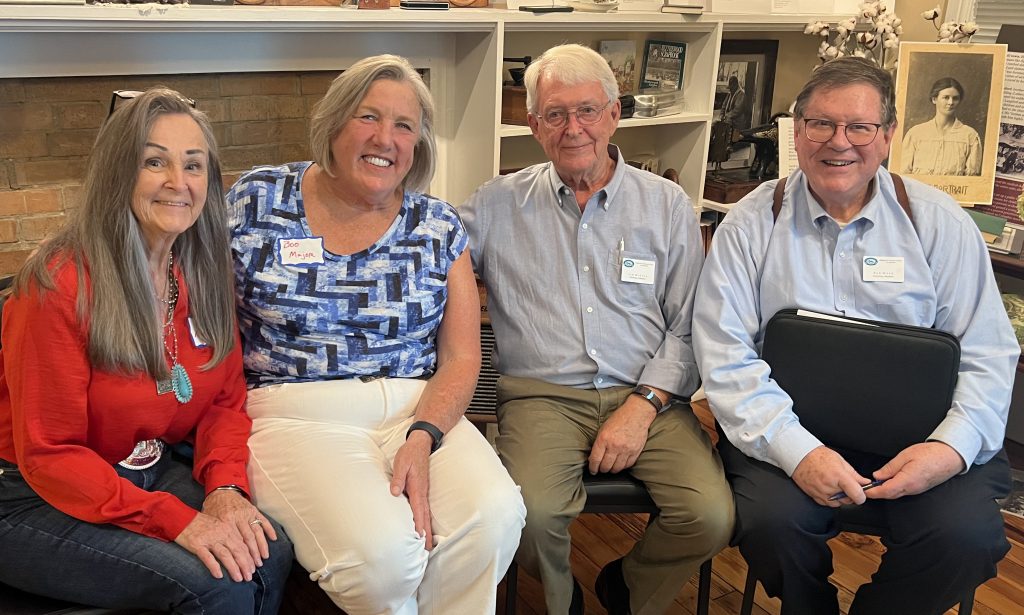
“Jimmy Jennings was very much a pied piper who could talk anyone into doing anything,” said Bob Woods, one of three presenters at the event. Woods said he spent days researching just who Jimmy Jennings was. He was a man, Woods said, who was passionate about whatever he was doing.
The kids called him Uncle Jimmy.
“He had power in the community,” Woods said. “But was he legit? Did he abuse that power? No. He did not. What I found out from my research is that he was a real cowboy from Texas and he was as good as anyone ever said he was. I wish I could imitate what he did here.

“There’s no way to describe what the JJ Ranch and Jimmy Jennings did here, except to hear it from y’all,” Woods told the crowd.
One by one, several members from the audience came to the front of the room to reminisce. Others spoke out from their seats. At times, many would join in on a particular story, laughing and sometimes wiping away tears as they relived their memories.
The Jennings’ daughter, Josie Atkinson, now 75, and a former rodeo queen, came to town for the event and talked about her own memories and the lifelong friendships that came from the JJ Ranch. There is a tight bond, still, between her and the former trail riders who clearly love her dearly.
One rider talked about the trail rides, overnight campouts by a lake six or seven miles from town, and eating beef stew prepared by the ranch cook and served in tin bowls out of a chuck wagon.
“When we got up in the mornings, Uncle Jimmy would give us a bar of soap and tell us to go wash up in the pond,” one woman said, with a laugh.
Another woman talked about how – on overnight trail rides – the riders would take care of their horses at the end of the day, eat dinner, then sing around a campfire before crawling into sleeping bags and going to sleep – just like cowboys.
“We used to sing a lot of songs around the campfire at night,” said Margie McCrory Hicks, whose mother, an attorney, was not only a JJ Ranch rider, but also took care of final paper work for the family after Jim and Sybil’s death.
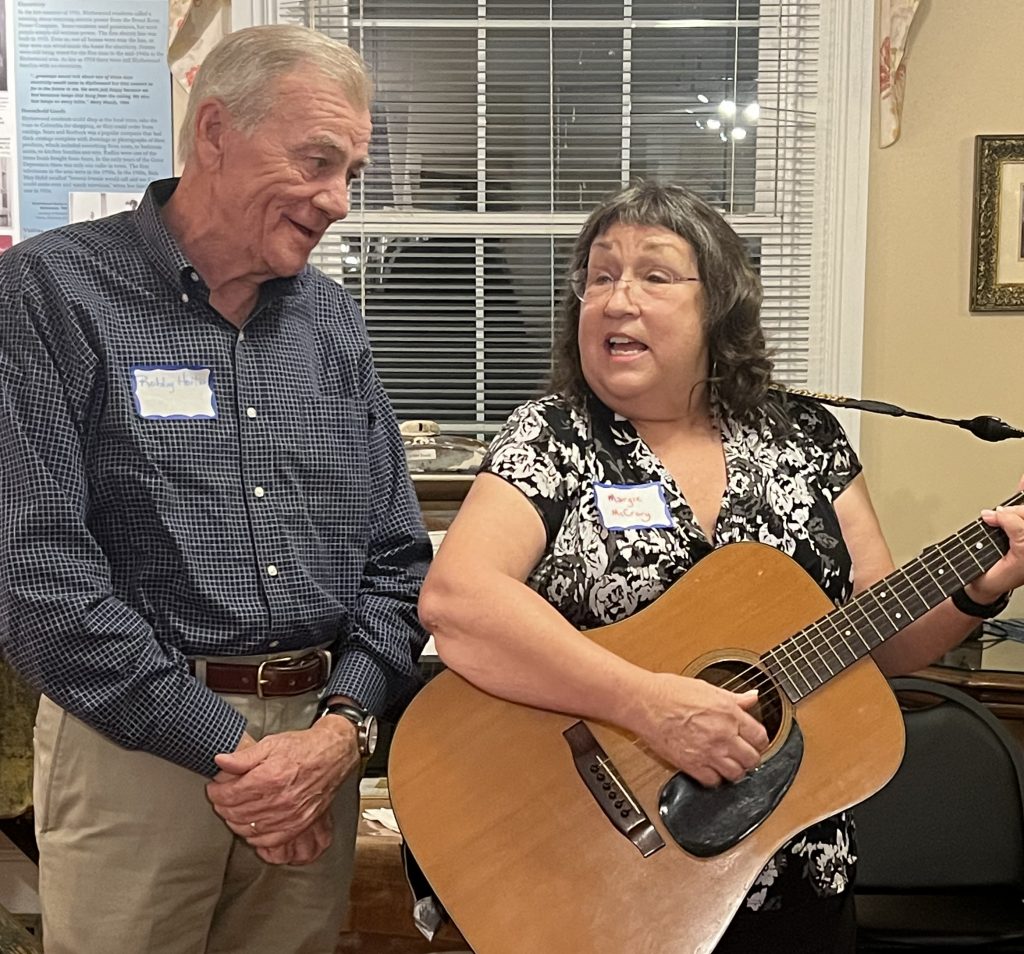
At one point during the evening, Hicks played her guitar as she and fellow JJ Ranch rider Robby Horton sang a duet – the JJ Ranch song – that Horton wrote when he was 11 years old.
It went like this …
We’ll saddle up our ponies and go riding, down by the fence made of rail
We will ride late at night by the pale moonlight,
Out there on that old dusty trail.
To live this life makes you wonder, why the boys and girls are happy and gay.
Now it’s been fun, enjoyed by everyone,
The old western life is here to stay.
Yippee Ki Yi Yay, will come that happy day,
To spend the night with them out on the trail.
Now you can see what hard work has done for me
At the JJ Ranch with the Jennings family.
Yippee Ki Yi Yay, will come that happy day,
To spend the night with them out on the trail.
The JJ Ranch trail riders were living their dream. They repeated frequently that it was like living in a western movie.
But the movie had a sad ending.
On Sept 6, 1964, Jimmy and Sybil Jennings died in a plane crash on the way home from a horse-buying trip to Arkansas.
The town was in shock and collectively and deeply mourned the loss of the Jennings and the JJ Ranch. For those who attended the remembrance event, the pain of that loss was still evident.
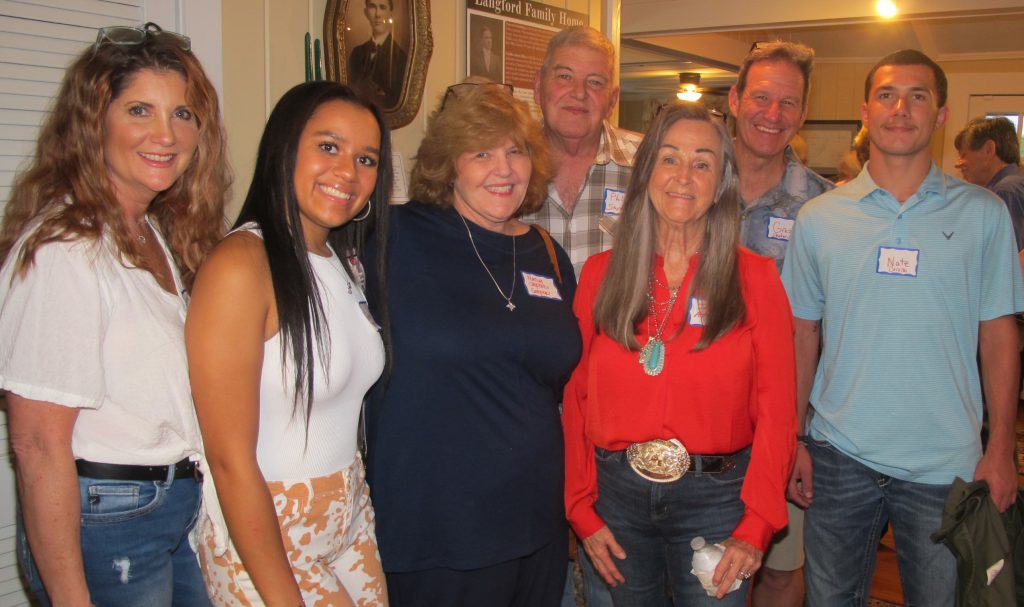
Horton, who led the campfire songs, said he was 13 when the Jennings died.
“I did a lot of crying,” said Horton, who went on to a singing career – first singing country and western songs, performing on such prestigious stages as the Grand Ole Opry, and then 30 years singing beach music on stage throughout the Southeast.
Boo Major, who learned to ride at the JJ Ranch when she was three, wondered aloud what the town would have been like today, had the Jennings not been killed in the crash.
Major said the JJ Ranch had a lasting effect on her life. She went on to become the head coach of the USC three-time National Champion Equestrian Team.
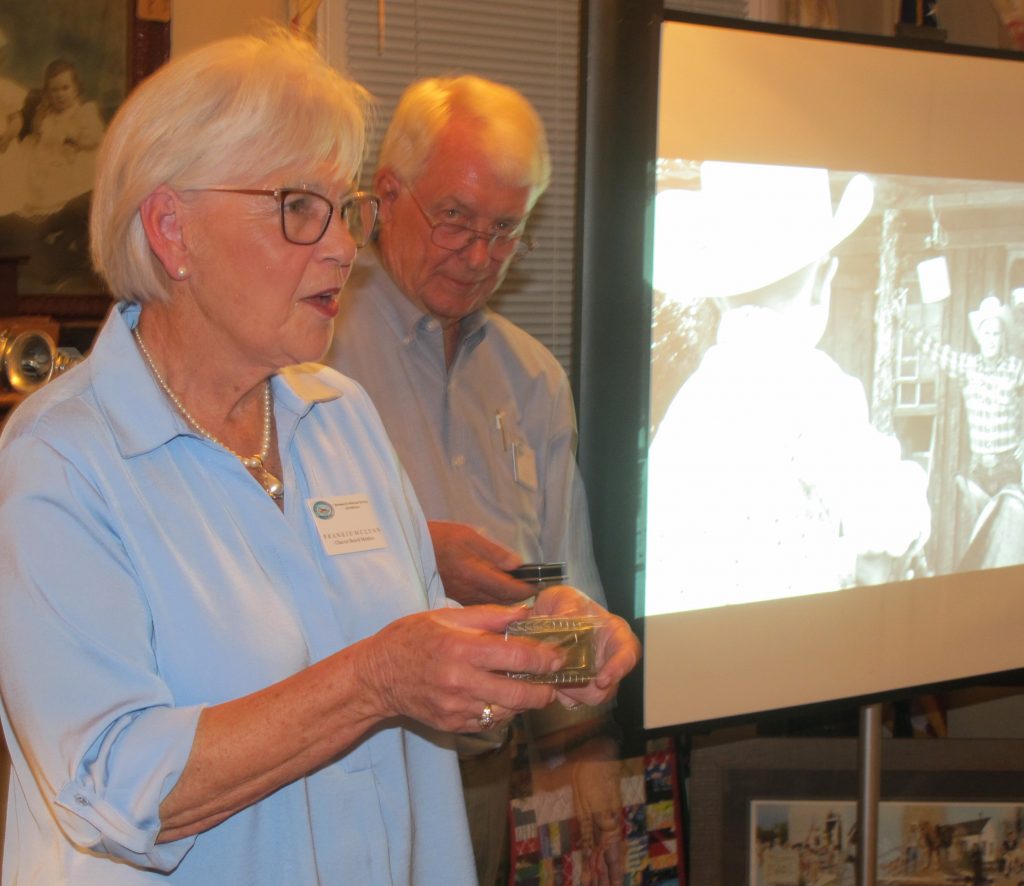
Frankie McLean with a JJ Ranch belt buckle. 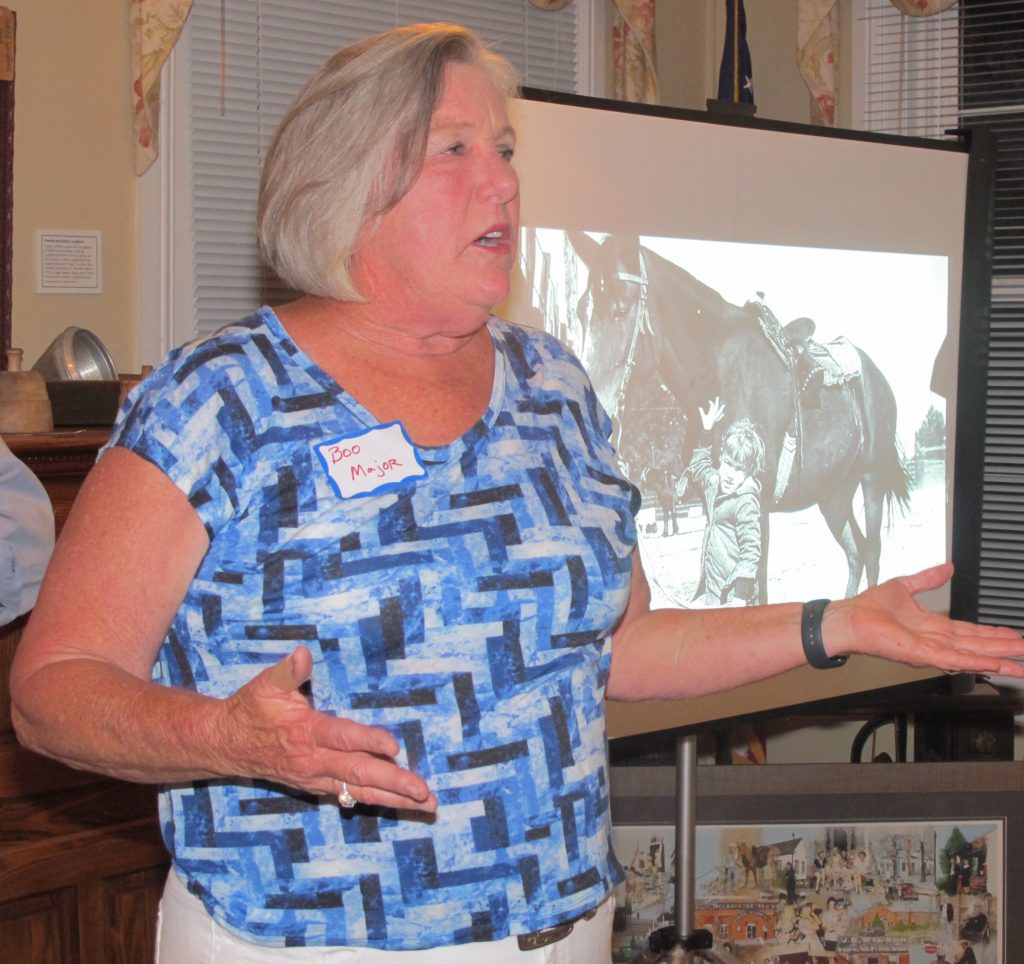
Boo Major and her horse 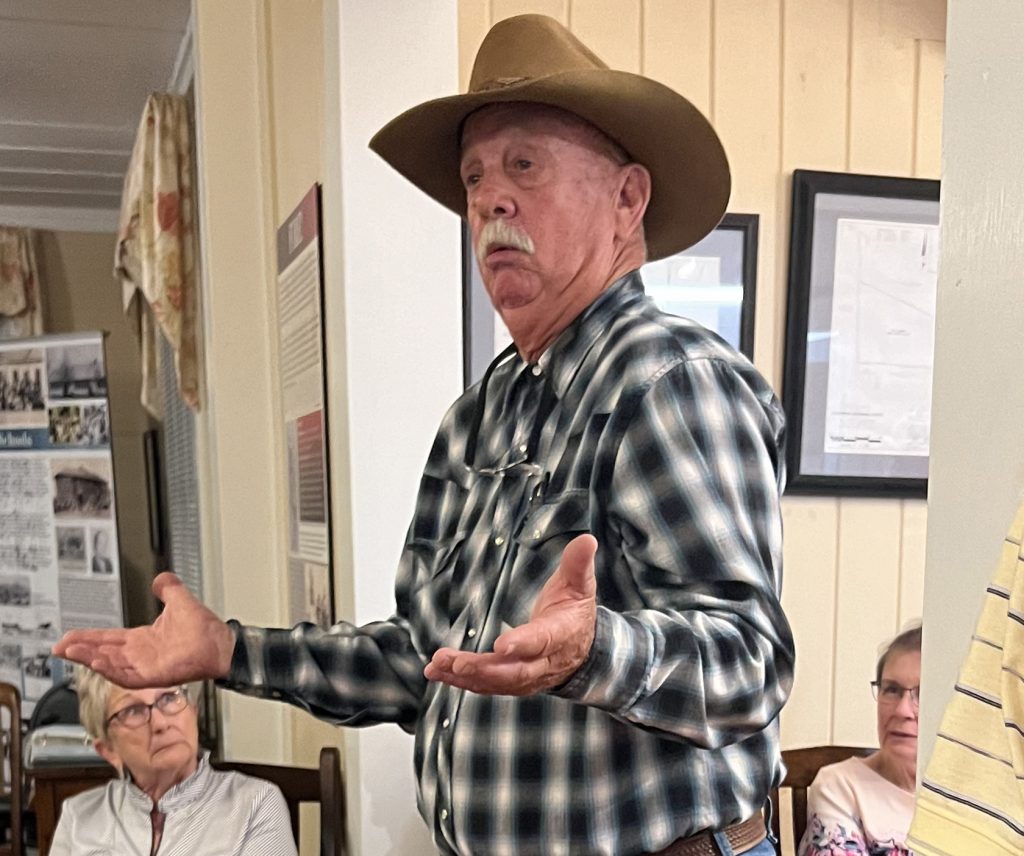
Wade Boozer
“It was a wonderful several years for us that ended tragically,” said former JJ Ranch rider Joel Donnelly.
The JJ Ranch riders and their families tried to keep the ranch going, but, about a year after the Jennings’ death, the Ranch had to be sold to pay its bills.
The JJ Ranch was a real-life cowboy version of Camelot. And, like Camelot, it ended tragically and all too soon. But for those who were part of it, the JJ Ranch was not, like Camelot, just a beautiful story in a book. It really happened.
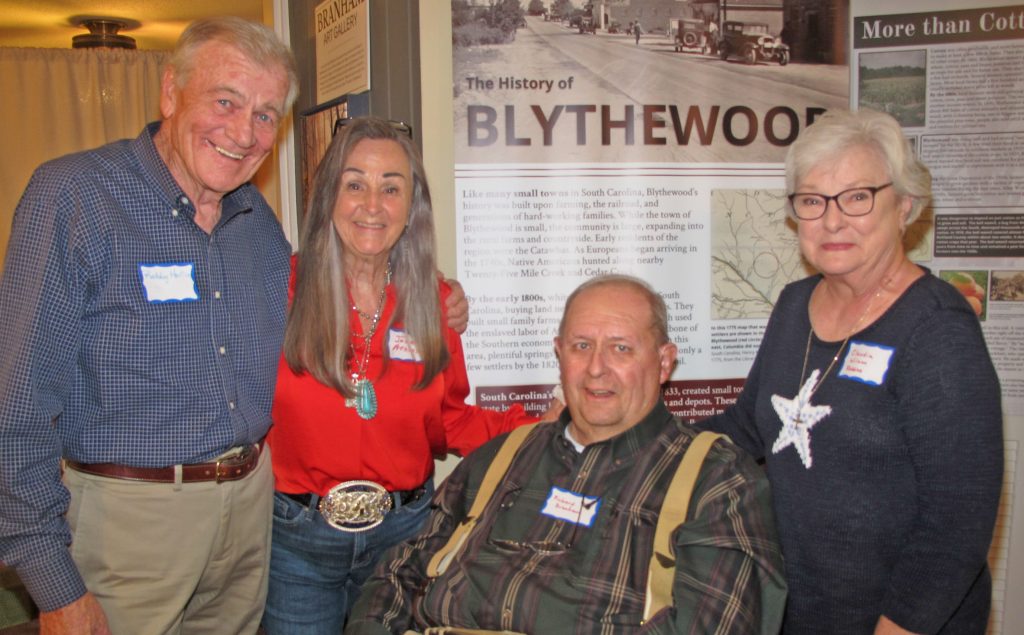
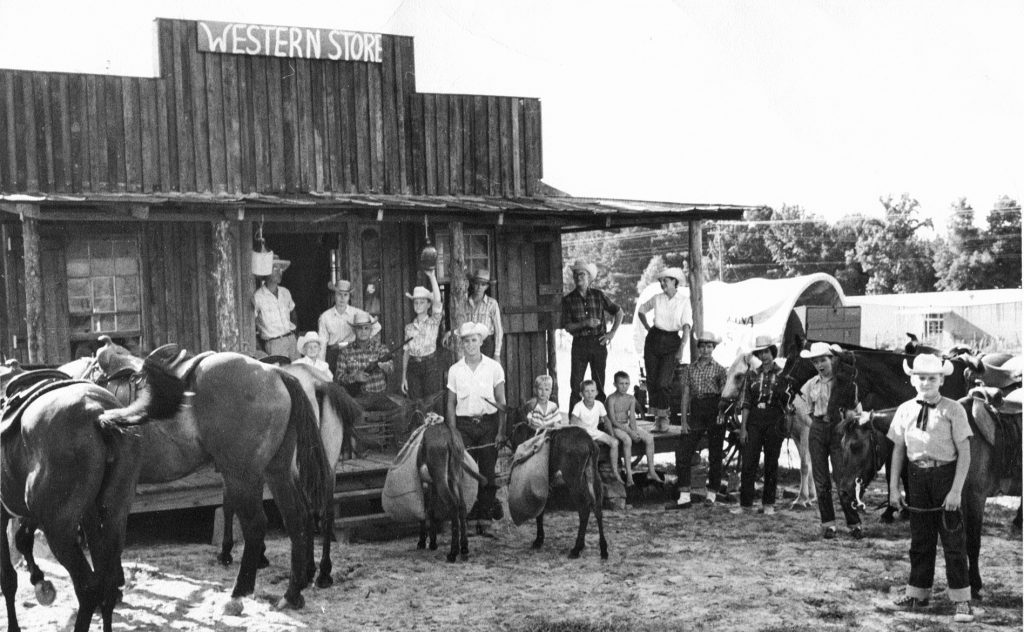
Dusty and the JJ Ranch
by Lynne Douglass
When I was a child I had a horse named Dusty. She was the most beautiful animal I had ever seen. Dusty was a thoroughbred, retired from the racing circuit. My dad bought her in Texas and had her shipped to South Carolina for me.
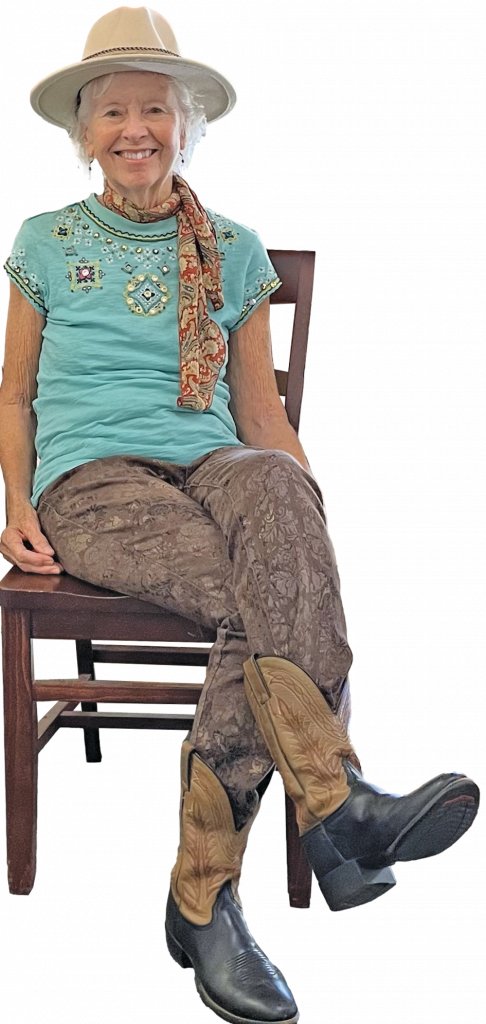
Dusty was a tall buckskin mare with a black mane and tail. I immediately fell in love with her. I had lessons from my dad on how to care for her, which was a sheer delight. I cleaned her stall, fed and watered her daily, and groomed her before and after each ride. She was so tall I was unable to saddle her by myself. I figured out how to climb up onto the fence and sit on the top rail, put her bridle on, then climb on her back. I found that I preferred riding bareback rather than with a saddle.
My dad loved to ride, too, and he had many friends that owned horses. He used to take our family to the JJ Ranch in Blythewood on Saturday evenings to watch events such as barrel racing and fancy horseback riding. I loved this ranch and its owner Mr. Jimmy Jennings, known to the kids as “Uncle Jimmy”.
Uncle Jimmy told my dad he was organizing a weekend trail ride for the youth riders with overnight camping under the stars, and he should consider letting me come along. Uncle Jimmy said I was a good rider and was ready to branch out a bit. Dad said I could, and I was beyond happy.
The following Saturday, my dad loaded Dusty into the horse trailer, and we headed to the ranch. Soon as all of us cowboys and cowgirls were saddled up, we started on our adventure. The May weather was perfect, and we were happy.
We rode all afternoon, through the woods on well-marked trails, across shallow creeks and dirt roads. We reached our destination about an hour before sunset. We groomed our horses and secured them for the night.
Uncle Jimmy had sent his crew ahead of us to pitch a huge open air army tent where we would sleep on army cots. We had a real chuckwagon with a cowboy cook and a large iron pot hanging over a campfire. The pot was full of beef stew. We ate from tin bowls with stars shining brightly overhead. The night was magical. At bedtime we unrolled our sleeping bags onto our cots, snuggled in and went to sleep.
I felt like I was in a western movie.
The next morning the tinkle of the cook’s breakfast triangle signaled that food was ready. Grits were dipped from the big iron pot; sausage and bacon were cooked from the open fire, and we ate like hungry cowboys and cowgirls.
After breakfast we saddled up our horses and took to the trails all day. Dusty was a fine trail horse, and she loved being with other horses. She was a gentle spirit and enjoyed this adventure as much as I did.
We picnicked along the creek bed at lunchtime, making our way back to the ranch by late afternoon. Our parents were there to greet us, load up our horses, pack up our gear, and take us home.
As I was saying goodbye to my fellow trail riders, I realized that I was crying. I was happy and sad at the same time. I laughed, cried, and talked all the way home, thankful for the beautiful experience. Sixty years later, as I write this, I remember every detail of this adventure.
From that weekend on, I wore a cowboy hat and boots …and I still do.
Long live the memories of the JJ Ranch. Uncle Jimmy did things right and we loved him for it. As for Dusty, she had a long, comfortable life and we had many more adventures together.
